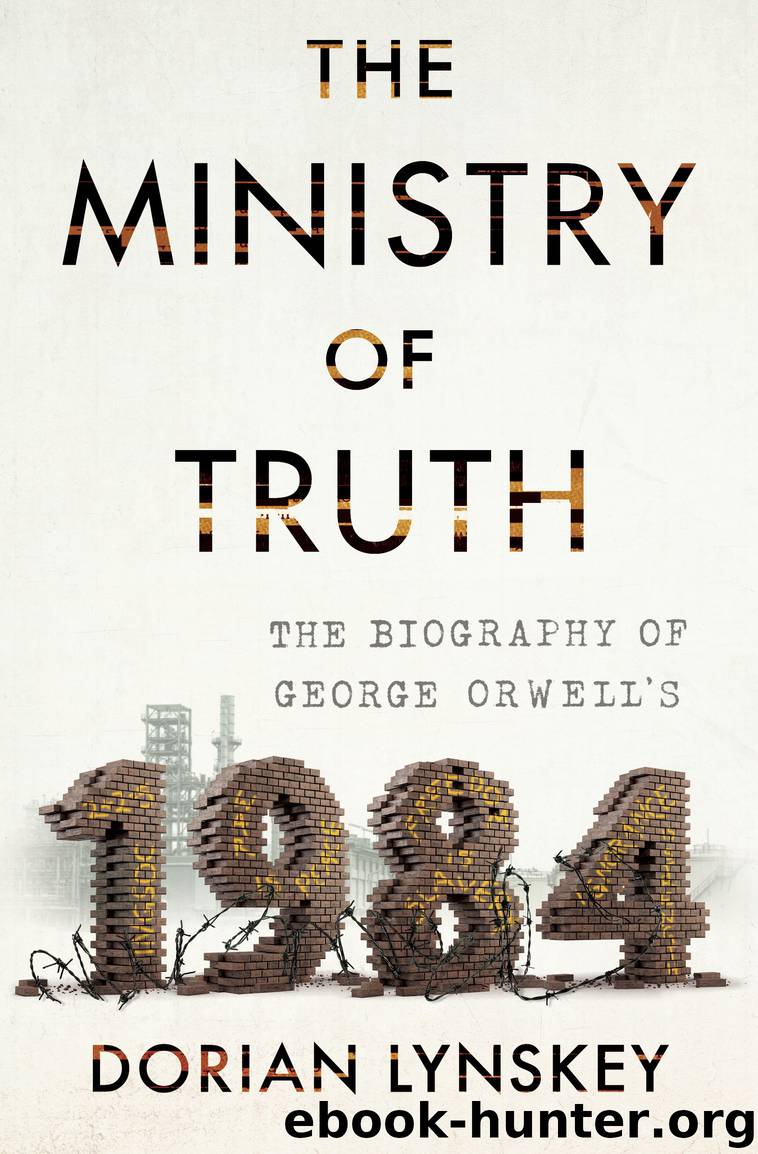The Ministry of Truth by Dorian Lynskey

Author:Dorian Lynskey
Language: eng
Format: epub
Publisher: Knopf Doubleday Publishing Group
Published: 2019-06-03T16:00:00+00:00
* * *
—
As far as Orwell was concerned, “a book doesn’t exist until it is finished.” He would neither share his drafts with friends nor discuss the contents in anything but the vaguest terms. In case he died in hospital, he instructed Rees to destroy the rough draft of what was still called The Last Man in Europe. It would either be finished or it would be shoved down the memory hole and reduced to ashes.
Given Orwell’s fear of anyone seeing his work in progress, it’s remarkable that early versions of Nineteen Eighty-Four survived at all. Pages from four drafts, amounting to 44 per cent of the novel, ended up in the hands of Daniel G. Siegel, a collector from Massachusetts, who agreed to publish a facsimile in 1984. Even this collage of fragments gives a decent impression of Orwell’s process and priorities. He was a ruthless self-editor, rewriting paragraphs several times over, on pages almost unreadably dense with amendments, to eliminate flabby phrasing and reinforce key ideas. The novel’s famously disorienting first line, for example, originally read: “It was a cold, blowy day in early April, and a million radios were striking thirteen.” This was the sixth of his books to open with the time of day.
The detailed notes Orwell made at Hairmyres laid out his priorities: clarify the role of the proles, the falsification of history and the suppression of sex in Oceania, and write the final chapter. Little was lost. The visit to O’Brien’s apartment was abbreviated, minimising the role of his sinister manservant Martin, and a subsequent encounter with Julia was dropped. Orwell drastically reduced allusions to real-world geography, references to race (including the lynching scene), and ironies that felt excessive. There is bone-dry humour in the novel, in the planned “spontaneous demonstrations” and compulsory “voluntary subscriptions,” but Orwell presumably considered the “Christian Pacifists” who call for twenty thousand Eurasian prisoners to be buried alive too heavy-handed. None of these amendments fundamentally altered the book’s narrative or agenda. To the contrary, the early drafts reveal just how consistent and focused Orwell was during those three years.
Orwell’s recovery faded with the summer. His health spiralled down so dramatically that by October he was sure he needed to go to a sanatorium, but still he kept working instead. He even managed to find time to write short pieces on Jean-Paul Sartre and T. S. Eliot, and a substantial article which made clear what his novel was not about.
In hindsight, Orwell might have regretted the name he chose for his totalitarian regime. As the ugly Newspeak contraction implied, Ingsoc was no more socialist than National Socialism. In a book where the Ministries of Truth, Love, Peace and Plenty are dedicated to the opposite values, it would be bizarre to interpret it literally, as English socialism. The Labour Party no longer exists and Goldstein’s book spells out the lie embedded in Ingsoc’s name: “Thus, the Party rejects and vilifies every principle for which the Socialist movement originally stood, and it chooses to do this in the name of Socialism.
Download
This site does not store any files on its server. We only index and link to content provided by other sites. Please contact the content providers to delete copyright contents if any and email us, we'll remove relevant links or contents immediately.
| Ancient & Classical | Arthurian Romance |
| Beat Generation | Feminist |
| Gothic & Romantic | LGBT |
| Medieval | Modern |
| Modernism | Postmodernism |
| Renaissance | Shakespeare |
| Surrealism | Victorian |
4 3 2 1: A Novel by Paul Auster(12393)
The handmaid's tale by Margaret Atwood(7764)
Giovanni's Room by James Baldwin(7346)
Asking the Right Questions: A Guide to Critical Thinking by M. Neil Browne & Stuart M. Keeley(5775)
Big Magic: Creative Living Beyond Fear by Elizabeth Gilbert(5772)
Ego Is the Enemy by Ryan Holiday(5450)
The Body: A Guide for Occupants by Bill Bryson(5097)
On Writing A Memoir of the Craft by Stephen King(4944)
Ken Follett - World without end by Ken Follett(4733)
Adulting by Kelly Williams Brown(4574)
Bluets by Maggie Nelson(4556)
Eat That Frog! by Brian Tracy(4540)
Guilty Pleasures by Laurell K Hamilton(4449)
The Poetry of Pablo Neruda by Pablo Neruda(4109)
Alive: The Story of the Andes Survivors by Piers Paul Read(4033)
White Noise - A Novel by Don DeLillo(4010)
Fingerprints of the Gods by Graham Hancock(4004)
The Book of Joy by Dalai Lama(3986)
The Bookshop by Penelope Fitzgerald(3854)
